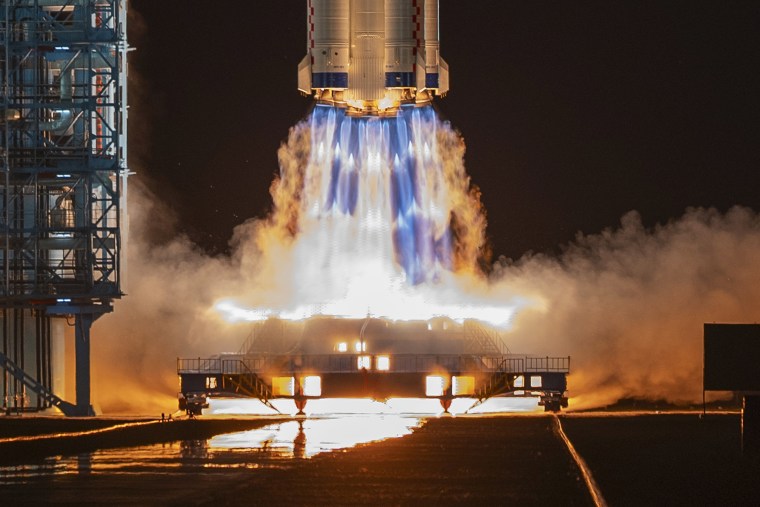-
Denzel Washington tops major year with 11th Golden Globes nomination - 6 mins ago
-
St. John's Zuby Ejiofor THROWS DOWN A VICIOUS DUNK vs. Butler - 24 mins ago
-
Russia’s Disastrous Winter War on Finland Could Give Clues on Ukraine Endgame - 40 mins ago
-
Magic Johnson, Lionel Messi among 19 Presidential Medal of Freedom recipients - about 1 hour ago
-
Fans React to Bulls Retiring Derrick Rose’s Jersey - about 1 hour ago
-
Buccaneers safety Jordan Whitehead injured in car accident, won’t play Sunday - 2 hours ago
-
Denny Hamlin Opens Up On NASCAR ‘Conflict’ – ‘Clear Where My Allegiance Lies’ - 2 hours ago
-
Nebraska upsets No. 15 UCLA following clutch block from Juwan Gary in 66-58 victory - 3 hours ago
-
The ‘Great Winter Bird Count’ Commences - 3 hours ago
-
Is Kawhi Leonard Playing? Final Injury Report For Clippers vs Hawks - 3 hours ago
China’s new crew arrives at space station in sign of growing influence in space field
JIUQUAN, China — A Chinese space ship carrying a three-person crew docked with its orbiting space station Tuesday as the country seeks to expand its exploration of outer space in competition with the United States, even as it looks for cooperation from other nations.
The team of two men and one woman will replace the astronauts who have lived on the Tiangong space station for the last six months, conducting a variety of experiments and maintaining the structure.
They are expected to stay until April or May of next year. The new mission commander, Cai Xuzhe, went to space in the Shenzhou-14 mission in 2022, while the other two, Song Lingdong and Wang Haoze, are first-time space travelers. Song and Wang were born in the 1990s and are graduates of the third wave of Chinese astronaut recruitment, having undergone a rigorous testing and training process taking years.
Song was an air force pilot and Wang an engineer with the China Aerospace Science and Technology Corporation. Wang will be the crew’s payload specialist and the third Chinese woman aboard a crewed mission.
Early Wednesday morning, China declared the launch and entry into outer space a “complete success.”
The Shenzhou-19 spaceship carrying the trio blasted off from the Jiuquan Satellite Launch Center in northwest China at 4:27 a.m. local time (4:27 p.m. Tuesday ET) atop a Long March-2F rocket, the backbone of China’s crewed space missions.
“The crew condition is good and the launch has been successful,” state broadcaster China Central Television announced.
China built its own space station after being excluded from the International Space Station, mainly because of U.S. concerns over the overall control over the space program by the People’s Liberation Army, the Chinese Communist Party’s military arm. China’s moon program is part of a growing rivalry with the U.S. and others, including Japan and India.
Besides putting a space station into orbit, the Chinese space agency has landed an explorer on Mars. It aims to put a person on the moon before 2030, which would make China the second nation after the United States to do so.
It also plans to build a research station on the moon and has already transferred rock and soil samples from the moon in a first for any nation in decades, and placed a rover on the little-explored far side of the moon in a global first.
The U.S. still leads in space exploration and plans to land astronauts on the moon for the first time in more than 50 years, though NASA pushed the target date back to 2026 earlier this year.

The new Chinese crew will perform spacewalks and install new equipment to protect the station from space debris, some of which was created by China.
According to NASA, large pieces of debris have been created by “satellite explosions and collisions.” China’s firing of a rocket to destroy a redundant weather satellite in 2007 and the “accidental collision of American and Russian communications satellites in 2009 greatly increased the amount of large debris in orbit,” it said.
China’s space authorities say they have measures in place in case their astronauts have to return to Earth earlier.
China launched its first crewed mission in 2003, becoming only the third nation to do so after the former Soviet Union and the United States. The space program is a source of enormous national pride and a hallmark of China’s technological advances over the past two decades.
Source link































